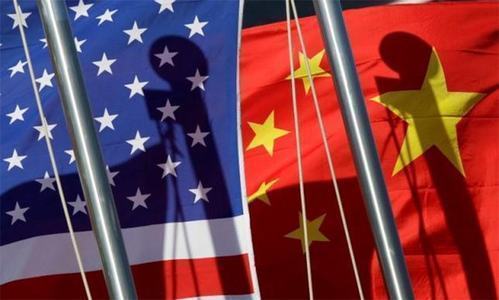Beijing on Tuesday accused Donald Trump of “blackmail” and warned it would retaliate in kind after the US president threatened to impose fresh tariffs on Chinese goods, pushing the world's two biggest economies closer to a trade war.
Trump said on Monday he had asked the US Trade Representative to target $200 billion worth of imports for a 10 percent levy, citing China's “unacceptable” move to raise its own tariffs.
He added he would identify an extra $200 billion of goods — for a possible total of $450 billion, or most Chinese imports — “if China increases its tariffs yet again”.
“Further action must be taken to encourage China to change its unfair practices, open its market to United States goods and accept a more balanced trade relationship with the United States,” Trump said in a statement.
Last week, he announced 25 percent tariffs on $50 billion in Chinese imports, prompting Beijing to retaliate with matching duties on US goods.
The US leader warned Friday of “additional tariffs” should Beijing hit back with tit-for-tat measures.
“The trade relationship between the United States and China must be much more equitable,” he said in explaining his latest decision.
“I have an excellent relationship with President Xi (Jinping), and we will continue working together on many issues.
But the United States will no longer be taken advantage of on trade by China and other countries in the world.”
China's commerce ministry immediately responded by saying the US “practice of extreme pressure and blackmail departed from the consensus reached by both sides during multiple negotiations and has also greatly disappointed international society”.
“If the US acts irrationally and issues a list, China will have no choice but to take comprehensive measures of a corresponding number and quality and take strong, powerful countermeasures.”
The news hit stock markets in Asia, where Shanghai shed three percent in the morning, Hong Kong lost more than two percent and Tokyo was one percent lower.
Trump is moving forward with the measures after months of sometimes fraught shuttle diplomacy in which Chinese offers to purchase more American goods failed to assuage his grievances over a widening trade imbalance and China's aggressive industrial development policies.
China had offered to ramp up purchases of American goods by $70 billion to help cut its yawning trade surplus with the United States, whereas Trump had demanded a $200 billion deficit cut.
'Unacceptable'
The China trade offensive is only one side of Trump's multi-front battle with the United States' economic partners as he presses ahead with his protectionist “America First” agenda.
Since June 1, steel and aluminium imports from the European Union, Canada and Mexico have been hit with tariffs of 25 percent and 10 percent, respectively.
“This latest action by China clearly indicates its determination to keep the United States at a permanent and unfair disadvantage, which is reflected in our massive $376 billion trade imbalance in goods,” Trump said of China's retaliatory tariffs.
“This is unacceptable.” Two decades ago, China's economy was largely fuelled by exports, but it has made progress in rebalancing towards domestic investment and consumption since the global financial crisis erupted last decade — limiting the damage trade tariffs could inflict on Beijing.
Still, strong exports this year have lifted the economy, which is now showing signs of losing steam under the weight of Beijing's war on debt, launched to clean up financial risks and rein in borrowing-fuelled growth.
Initially, 545 US products valued at $34 billion will be targeted by China, mimicking the Trump administration's tariff rollout.
Beijing wants to “demonstrate that things will be done their way or not at all,” said Christopher Balding, an economics professor at Shenzhen's HSBC Business School, who believes Chinese policymakers prefer demonstrations of “power and control” over “technical policy rightness.”
“It is a game of chicken,” Balding said.
So far Beijing has targeted major American exports to China such as soybeans, which brought in $14 billion in sales last year, and are grown in states that supported Trump during the 2016 presidential election, as well as other politically important products.
Officials also drew up a second list of $16 billion in chemical and energy products to hit with new tariffs, though China did not announce a date for imposing them.
More American targets are likely to follow as soon as the Trump administration follows through with publishing an expanded tariff list.













































